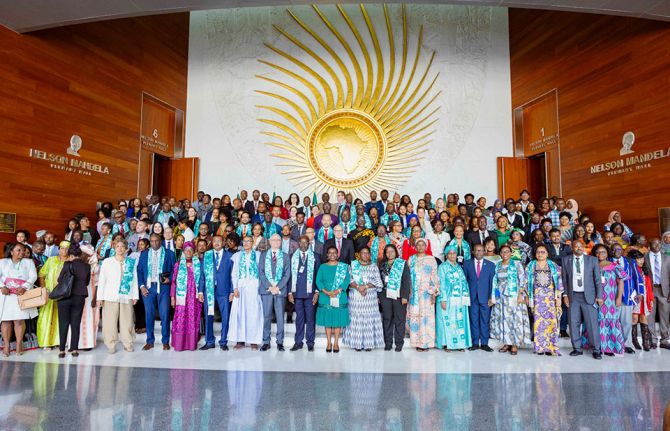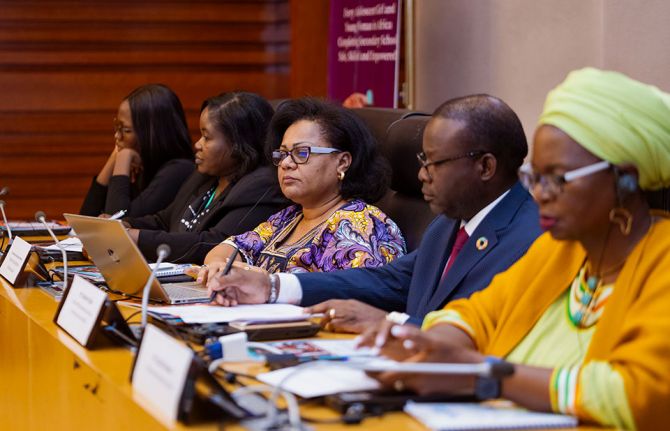



Feature Story
Girls’ education for HIV prevention at 1st Pan-African Conference on Girls’ and Women’s Education in Africa
08 July 2024
08 July 2024 08 July 2024Girls’ education as a tool to prevent HIV infection has been centered at the 1st African Union Pan-African Conference on Girls’ and Women’s Education in Africa. This followed African leaders designating education as the 2024 African Union theme of the year.
At a high-level side event hosted by the Education Plus Initiative on the first day of conference held at the African Union Commission in Addis Ababa, Ethiopia, leaders, girls’ and women’s networks and advocates called for greater investments in girls’ education.
“Some people claim that providing girls with secondary education is too expensive. Such claims fail to consider the exponentially higher cost of not educating them,” said UNAIDS Executive Director, Winnie Byanyima. “We can get all our girls and boys to complete secondary education; that should be our legacy."
UNICEF calculates that 34 million girls in sub-Saharan Africa are out of secondary school. According to the Global Education Monitoring (GEM) Report 2023, in all regions in Africa, there are more girls out of school at the secondary level than boys, with gender disparities worsening as children move up to higher levels of education in favour of boys over girls. In sub-Saharan Africa, less than half of adolescent girls complete secondary education, their percentage standing at 42% and there has been no progress at all in closing this gap in the past 20 years. Sub-Saharan Africa is the region furthest from parity at the expense of girls, with no progress since 2011 at the lower secondary level and since 2014 in upper secondary.
Gender is a key factor linked to disparities in enrolment, retention, completion, and learning outcomes through social conditioning, gender-based differences in parental expectations and education-related investments, child marriages and early childbearing, female genital mutilation, child labour, gender-based violence, period poverty and discrimination.
More than forty years into the HIV response, Africa remains an epicenter of the AIDS epidemic with adolescent girls and young women being disproportionately affected. Every week 3100 adolescent girls and young women acquired HIV in sub-Saharan Africa. Every three minutes, an adolescent girl or young woman aged 15-24 years acquired HIV in 2022 in sub-Saharan Africa. Adolescent girls and young women aged 15-24 years in the region were more than three times as likely to acquire HIV than their male peers in 2022.
UN agencies, African Union representatives, government ministers, and young women leaders called for accelerated actions to translate commitments to action through leveraging girls' education for gender equality and preventing HIV, child marriage, teenage pregnancies, violence, gender-related stigma and discrimination in Africa.
Speakers emphasized the connection between health and education. Ministers spoke about key policy reforms and best practices aimed at promoting girls' education, including creating safe and inclusive school environments, strategies to get girls into secondary school, and the readmission policy that addresses high dropout rates due to pregnancy. UN co-leads emphasised the need for improved collection of data disaggregated by sex and other relevant population characteristics to better understand educational participation, progression, and learning, and using gender-sensitive data for policymaking and planning.
Other issues highlighted included the integration of digital literacy programs into the secondary education and vocational training curriculum to facilitate smooth transitions from school to employment; integrate gender equality into all aspects of the education system, including curriculum-based comprehensive sexuality education and life skills, address gender-based violence within schools and discriminatory laws and practices, and access to information, non-discriminatory HIV and sexual and reproductive health services access.
Young women leaders spoke on the role of partnerships and young women's leadership. Participants highlighted the upcoming 30th anniversary of the Beijing Declaration as an opportunity moment to accelerate accountability and commitments, as well as the CSW Resolution 60/2, Women, the Girl Child and HIV and AIDS as significant mechanisms to address political and resource gaps so no woman or girl is behind in the HIV response.
Education Plus is a rights-based, gender-responsive action agenda to ensure adolescent girls and young women have equal access to quality secondary education, alongside key education and health services and support for their economic autonomy and empowerment. Co-led by five UN agencies, the initiative builds on existing frameworks like the Transforming Education Summit, the Continental Education Strategy for Africa (CESA) and the Dakar Education for All (EFA) Declaration to push for access and completion of education for women and girls in Africa.
Quotes
" Some people claim that providing girls with secondary education is too expensive. Such claims fail to consider the exponentially higher cost of not educating them. We know the consequences when girls can’t finish secondary school: higher risks of sexual violence, early marriage, unwanted pregnancy, complications in pregnancy and childbirth, and HIV infection. But when a girl completes secondary school, it helps her to be safe and strong. If all girls complete secondary education, adolescent pregnancy could be cut by 75% and early marriage could be virtually eliminated. An extra year of secondary school can increase women’s eventual wages by 15-25%. We can get all our girls and boys to complete secondary education; that should be our legacy."
We must recognize the intersecting challenges girls face, including HIV. They face extraordinarily high levels of HIV infections. Women and girls represented 63% of all new HIV infections in Africa in 2022. Empowering girls with knowledge is key to ending AIDS as a public health threat. Education is the best HIV prevention tool available.”
“African nations should ensure that young people not only gain vital knowledge but also acquire life skills, values, attitudes, and make decisions in order to live healthy and fulfilled lives. Through the AU strategy, we will see increased awareness about the importance of investing in education and the health of children and adolescents.”
“Girls’ education is not only a right, but will also result in broad socio-economic development for countries. We are creating a safe and conducive environment for adolescent girls and young through the criminalization of child marriage, FGM, school-related gender-based violence, and sexual harassment, particularly sexual exploitation perpetrated by teachers. We provide life skills and comprehensive sexuality education in schools and ensure an inclusive school environment for children with disabilities, with specific attention to girls. We have enhanced social protection strategies, including cash transfers to poor households to ensure that girls go to school and are not engaged in care work and child labour.”
“Girls who dropped out due to early pregnancies or early unwanted pregnancies are readmitted. We have a national girls’ education strategy aimed at facilitating the pace at which Malawi may achieve sustainable development goals. We emphasize universal primary education, the promotion of gender equality and empowering women.”
“We are trying to remove the cultural norm barriers and negative gender stereotypes that contribute to gender-based violence and discrimination against adolescent girls and young women with a male engagement strategy. Inclusive education provides special provisions for the less privileged and disadvantaged children and youth; user-friendly infrastructure, teaching and learning materials and provision of expert teachers.”
“Education is a human right. The Education Plus Initiative is driving policy changes in Africa. Education Plus seeks to keep adolescent girls and young women in school by simply unequivocally saying no to child marriage, no to violence, no to HIV infections, no to gender-related stigma, and of course, no to harmful practices. We want to keep girls in secondary education and make sure they stay there and complete their education. We do that by supporting sexual and reproductive health and rights, comprehensive sexuality education and work for integration HIV awareness, preventing and managing learners pregnancies and addressing school-related gender-based violence.”
“We need to scale up effective interventions to increase HIV knowledge and transform gender norms, and hence girls’ access to services. We should explore the potential of innovative solutions offered by digital technologies to mobilize and provide young women and adolescent girls with comprehensive HIV information. Let's do more, particularly for those girls living with HIV to be meaningfully engaged in the HIV response. Young women must have a formal seat and a safe space to raise their needs. let's move from rhetoric to action.”
“The numbers are unfortunately very clear: highest adolescent pregnancy rates of the world are in sub-Saharan Africa, highest percentages of women first married or in union before 18, young women more than 3 times as likely of HIV infection, or unacceptably high rates of justification of wife beating among adolescents. Fortunately, we benefit from a strong set of political commitments and strategies to face these issues. There is the Education Plus Initiative, the WCA Commitment for Educated, Healthy and Thriving Adolescents and Young People, the ESA Commitment, and the AU Continental Strategy on Education for Health and Wellbeing of Young People in Africa. It is high time to convert the commitments and strategies in concrete results for adolescent girls and young women.”
“Girls need an affirming environment. Where there's ignorance, there's a lot of resistance to education and sexuality education in the curriculum. We need to engage to change the environment, talking with parents, men and boys, community members and leaders for them to have access to information because they have a great influence on the lives of these young people. We need inclusive advocacy, especially the rural grassroots and true localization of information and interventions.”



